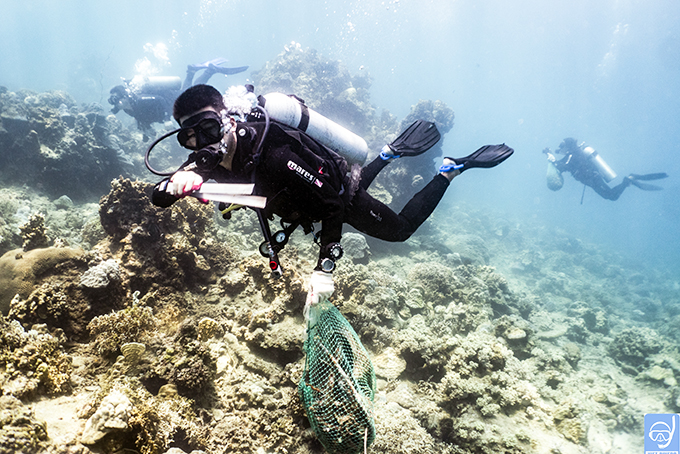Seeing marine species struggling with litter of all kinds in water, many young ocean-lovers have initiated and maintained an ocean clean-up campaign, drawing more and more volunteers for several years.
5 years with beach clean-up
Nguyen Van Duc, a diving instructor of Rainbow Divers Company, Nha Trang City, has become an initiator of the marine clean-up activity since 2006 when he found coral reefs and other marine species get stuck in trash and die. He also mentions this activity in his diving courses. After each diving course, he organizes beach clean-up to raise public awareness of environmental protection. It’s much harder to pick up trash in water than on land. The trash is then taken to the port and then to treatment locations on land. He has taught more than 500 people so far and most of them regularly join the clean-up activity, scouring the sea floor for trash.

Viet Divers Club's members pick up litter from Nha Trang Bay seabed.
Initiated in 2013, Viet Divers Club in Ho Chi Minh City has also attracted many young people to its clean-up activities in many sea waters of Vietnam such as Nha Trang, Cu Lao Cham, Con Dao, etc. According to To Thi Dieu Thuy, a member of Viet Divers Club, while diving, they have removed all kinds of bags and containers, including bottles, plastic cans, straws, finishing lines, etc. from the sea floor.
Currently, the divers vary in ages, but mostly young ages. Joining the activity, although having to pay for all their personal expenses such as travel, accommodation and meals, divers are still eager and excited due to their great love for the sea, marine life and diving.
Inspiring
Reportedly, members of Viet Divers Club and Rainbow Divers Clubs often take photos and videos of ocean trash and clean-up to promote the good deeds as well as inspire the environmental protection effort across the country.
Associate Professor and PhD. Vo Si Tuan, former Director of the Institute of Oceanography says, “I know about the beach clean-up campaign of young people and dive clubs’ members. This activity is worth appreciation and motivation, contributing to raising awareness of marine pollution and action to stop littering the sea.”
Currently, 60 - 70% of trash in the sea come from the mainland. The rest is from activities at sea such as fishing, marine transportation and tourism practice. Therefore, protecting the marine environment and preventing environmental pollution require the joint effort of the Government, all agencies, businesses and residents, according to Le Thi Thu Hong, Head of the Agency of Seas & Islands, the Department of Natural Resources & Environment.
Thai Thinh - Translated by N.T